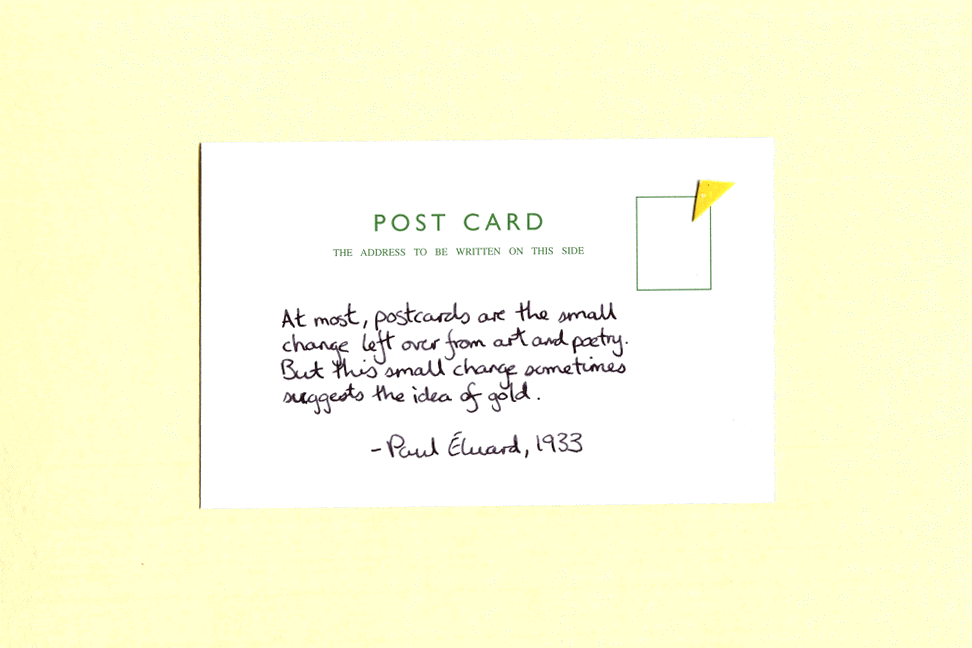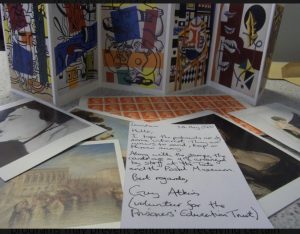The ‘This Small Change’ project is asking museums to offer postcards to prisoners, to help alleviate the extreme conditions they face during lockdown.
Artist Guy Atkins, who has been working with PET on the project, explains how it came about.

“At most, postcards are the small change left over from art and poetry. But this small change sometimes suggests the idea of gold.” Paul Éluard, 1933 – Three of 100 handwritten cards distributed as part of the pilot at Pentonville.
In March, at the onset of the pandemic, a housemate working in a mental health unit was finding it tough going.
The consequences of the lockdown for his patients were becoming severe: among other restrictions, patients were no longer allowed out of the facility, even on accompanied trips. The only accessible external space was a small enclosed garden.
As well as keeping everyone safe, staff were under pressure to think of more activities that could be undertaken indoors.
Rooting round the house, we put together a pack of art gallery postcards and a few stamps. The next day, my housemate offered them as a gift to patients. While not all appreciated them, a couple really did: they wrote a series of cards to their families who could no longer visit.
Encouraged by the response, I contacted Francesca Cooney, PET’s Head of Policy, to see if something similar would be of interest to people in prisons.
Francesca thought, given the conditions in prisons during the lockdown, it would be worth giving it a try. She explained prisoners were in their cells nearly all day; libraries and gyms had been closed; and all visits cancelled. Alarmingly, there were also reports of more incidents of self harm.
Together, we devised a scheme to see if museums – themselves closed to the public during lockdown – could send stocks of gift shop postcards to prison education teams. The hope was that the postcards would be of interest to prisoners in their cells.

Tate’s Distribution Manager, Keith McCubbin, with a box of postcards destined for Pentonville.
Thanks to the efforts of many people across a number of institutions, the pilot scheme – between HMP Pentonville, Tate and the Postal Museum – has been a success.
Despite the challenges of remote working, we were able to distribute 100 ‘packs’ of cards to prisoners. Each pack included a handwritten card explaining the project, a selection of cards from the Tate, and some first class stamps donated by the Postal Museum.
We were also very grateful to Jose Aguiar, a prisons education consultant, who worked with men in HMP Pentonville to put the packs together and to distribute them to other prisoners.
The different elements of the pack had to be sent into the prison separately and collated by Jose and his team. We also needed special permission from the governors of HM Pentonville to include stamps in the packs.
Jose said the men were really impressed with the cards, commenting that it is rare for prisoners to see anything as beautiful and of such quality as the Tate cards.
Here are some of their comments:
The postcard created a window to my family.
I never felt so proud to write to my son. A proper postcard.
A postcard has its own message.

The ‘packs’ of postcards were assembled by men in HMP Pentonville
In this way, the project has been a reminder that even the simplest of objects can change in value according to their context. In the longer term, we hope to build continuing relationships between the museums and the men at Pentonville.
We are delighted that other cultural institutions have signed up to send material to prisons, and hope more museums and galleries will join in the near future.